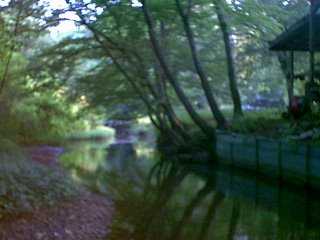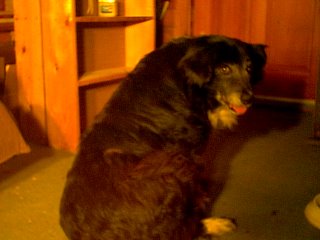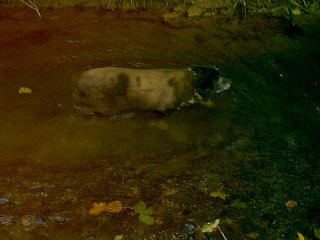Iraqui death toll rises above 100 per day, U.N. says
- headline in the New York Times 7/19/06
The vines turn clockwise here, but then
I know other places they run counter,
Depending on location of one's garden,
Depending on proximity to the pole.
How are your vines growing,
Do they blossom just the same,
Do your children run barefoot down the rows,
Have you had enough rain?
Oh. Do you have a garden,
A safe place for you to be,
Is there still a bit of earth free
of blood and pain...?
I prepare my garden harvest,
Set heaping bowls and platters on the table,
And call to those I love the best,
We eat and laugh and eat again.
Now as the earth turns to you another day,
I see you bring to your table bread for all,
But oh. Are there any left now,
Any left to call...
Monday, July 31, 2006
Saturday, July 22, 2006
At Home By Cane Creek

This is the best time of the Summer day, when the sun has dropped, a
soft cool breeze stirs, and the birds twitter and chatter, and sometimes a fragment
of song, as if bidding one another good night.
The security light has come on. The globe glows, but will not cast forth light
until it is dark. The bats are gliding in, following the line of the creek, sometimes
swooping down to the water and back, their high-pitched cries cutting across
the last bird sounds.
This strange evening light without the sun softens all the colors, a prelude to
the graying into night.
I've searched without sucess for a picture of the white caterpillar that fell from
the sycamore tree today. It was a fuzzy cream color with fierce-looking feelers
like two horns on its head. My books usually help me to identify the creatures
who live with me and around me.
Sometimes I ask. The long brown feather found in my yard is from a wild turkey,
my son said. Looking at its large, hollow shaft I understand how quill pens were
made. Quite a reservoir for ink there.
I've seen flocks of wild turkeys in the pasture behind this house, and one fall
morning there were a dozen or so in the yard not far from the road. But that was
a year or so ago, and none was as large as the turkeys people raise in pens. The
size and color of the feather prevented my connecting it with the turkeys
traveling through.
The swallow nesting near the edge of the porch roof has stolen back to her
nest, deciding that I'll stay in my rocker for awhile. She pays dearly for the
convenience of her shelter by feeling she has to fly to a nearby tree each time I
come out on the porch, day or night. If the baby birds happen to have their
heads above the nest, they freeze stock still while she coaches from the tree,
until I move away.
This was the second hatching from the same nest, so she didn't even have to
build it. I was watching through the window when the first set of four took their
first flight. They lined up outside the nest while their mother chirruped at them
from the tree.
It was as if she were crying, "Fly! Fly!"
And fly they did, or three of them, that is, albeit somewhat clumsily, one seeming
barely able to make it to the tree only about six feet away, where he fluttered
against the trunk for seconds, then upward a few more inches and onto a branch.
One teetered at the edge of the board, or huddled with back against a brace, all
the while his mother's cries growing shriller, more agitated.
I thought of a parachutist instructor barking out: "Jump! Jump!"
But the bird language might translate more like this: "Fly, you fool! Now!"
His entire three weeks of life had been spent in the safety of the nest,
sheltered by the porch roof, warmed at night beneath his mother's wings,
and now he was being forced to become airborne, with none of the human
baby's chance of trial and error, stumbling and falling, and up to try again,
for he must jump and know at once how to use his untried wings, for his
mother cannot save him if he falls to the danger and even death that may
await him on the ground.
Now the nest is crowded again, although there are only three young ones
this time. The profilgacy of nature. Let there be swallows. Seven new ones,
just in this small spot. There must be an abundance of bugs awaiting hungry
swallows, or else the attrition rate is such that more swallows must be brought
forth just to maintain the swallow ratio among the birds.
I know there are hawks around, and they seem more bold. Only yesterday one
perched in a tree across the creek and sat there watching for at least a
quarter-of-an-hour. And only a few days ago I saw through the kitchen window
a hawk struggling to fly. He would rise a few feet, then sink back to the ground.
It looked as if he were trapped in some fabric-like material caught about his legs.
After watching for several minutes, I thought I must somehow go to his aid.
Perhaps I could grab the material and pull it off of him, or could I throw a net
over him and call a wildlife rescue group?
I thought of ducks getting their feet and bills bound by the plastic six-pack
holders that people toss aside. What careless or deliberate human act had
crippled this wild and beautiful bird.
But as soon as the hawk saw me, he dropped the shredded squirrel and
flew away without his meal.
After recovering from surprise at such rejection and negation of my
misguided impulse to help, I began to hope he'd gotten the squirrel that robs
the bird feeder at the back deck. That squirrel doesn't just eat, he curls
himself around the feeder, and throws out and scatters the seeds he doesn't
want as he searches for the few sunflower seeds.
I know there are people with bigger problems with bird feeders than squirrels,
and here is an example:
Or maybe the hawk got the squirrel that gnawed wider the gap in the enclosed
part of the eaves behind the security light and built a nest in the wall against my
office. I've seen him scratching himself. I fear that my office may soon be infested
with fleas and mites.
Or it may have been the squirrel that ate most of the hickory nuts while they were
still green. Most of those that fell last year had holes gnawed in one side, the
insides hollowed out.
Years ago there were hunters, my father among them, going after squirrels for
food. But now with the deer plentiful again, and still enough quail and wild turkey,
one seldom hears of hunters hunting squirrels and rabbits, and there is an
abundance of them.
Buckie catches and eats an occasional rabbit.
I feel sure that must have been the way he kept himself alive when he was abandoned.
But although Buckie and Grace and Buster chased many squirrels, they never caught
one. I don't think most dogs do. The squirrels are too swift for them,
the trees too handy.
It is dark now, and Buckie has begun his evening back and forth with the other
dogs within his hearing distance. It is a nightly ritual that he seems to enjoy. He
stands in his yard and barks and barks, then stops to hear the answering barking,
from the closest house to the faintest sounds somewhere way down the road,
then he's off again.
It is like the primitive tribal communication by tom-tom.
There is no special quality to this evening barking, no urgency nor sounds of
alarm or warning, no threats, just barking to communicate: Here I am. Here in
my yard. And yes, it's reassuring to know that you are there, and you, and all
where each belongs....
It is time for me to go inside now where I belong.
No longer just a building that houses my office, a recreation spot by the creek, this
has been my home since my house burned, and although the pain of loss recurs, I
am somewhat contented.
I, too, for now at least, am where I belong.
Subscribe to:
Comments (Atom)


